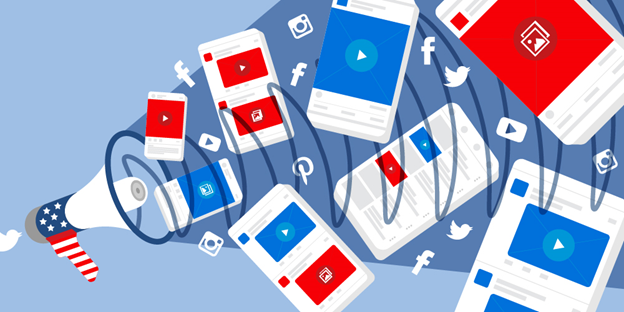Politics & Social Media
January 7, 2020
In an age where communication is as easily accessible as the swipe of a finger and trends fall as quickly as they rise, the customs of the past can no longer be considered appropriate nor practical in the modern-day world. This is particularly true when it comes to politics. Whether it be a message aimed at spreading awareness over an issue or an ad belittling another candidate, social media has allowed politics to keep up with technology. As a result, the methods used by political campaigns have been fundamentally changed, having the power to gain hundreds of followers in an instant and lose even more in the next.
Despite this achievement, it can be argued that social media has given politics too much freedom by tolerating campaign ads that speak false information and mislead voters. In fact, politically biased sources are allowed to “stir the pot” so much so that it has become questionable if safeguarding voters from “foreign hackers” and outside influences is even the real threat.
Over the course of the 2016 election, the candidate’s costs exceeded $63 million in marketing on social media, according to The New Yorker. This goes to show how crucial social media has become in regards to a successful political career. It also presents an alarming change where politicians rely on social media over other methods of contact.
So much content is being produced on social media that social media platforms currently lack a comprehensive way to filter through ads and determine its legitimacy. It is no surprise these platforms prefer to be seen as neutral bystanders. Unfortunately, this is not the case, as these companies are not only racking in profit from the ads they show but have algorithms to moderate content which are inherently biased. Besides, there is no room for false claims to be debated because these algorithms only show them to the users who are most susceptible to believing the information.By allowing deceitful content to be produced as “neutral platforms” they only encourage politicians to push the limits of their campaigns. A key example of this was shown when the Trump campaign falsely accused former vice-president Joe Biden of “bribing” Ukrainian officials to drop a case on his son. After unfairly hurting Biden’s campaign, and without hard evidence to substantiate the claims, Facebook would not take down the ad. In a hearing before the House of Representatives, CEO Mark Zuckerberg told Congressional representatives that Facebook generally does not fact check ads on their website. f platforms like Facebook are willing to give this much freedom by allowing campaigns to buy any ad, what is stopping others from turning politics into a battle of quips and lies? To illustrate such flaws, the Warren campaign paid for an ad that claimed the CEO of Facebook, Mark Zuckerberg, endorsed Trump for President.
On the flip side, social media does have its merits. It allows for increased connectivity among like-minded people, something especially helpful when building grassroots support for a political campaign. Social media has the potential to influence millions in a short period of time for a political campaign, rather than at less reliant numbers over long periods of time with “outdated” methods such as going door to door. The fact that social media includes millennials and Gen Zers is another object of interest in the elections. To show just how important a role social media has on the election, one can look towards the Pew Research Center which informs us that the next generation will make up 37% of eligible voters in 2020. This is significant, extremely significant, albeit one fact, “only 46% of 18- to 29-year-olds voted in 2016, compared to nearly 71% of voters 65 and older” according to Forbes. Social media would have the power to “mobilize” these young voters for the future no matter what the party.
Although social media certainly has its strengths, “making specious claims about a political opponent has a long and storied history in this country,” reports The New Yorker. Social media has made it worse, going to show how we aren’t yet mature enough for the technology of our time.
Graphics courtesy of TTMIND.COM

